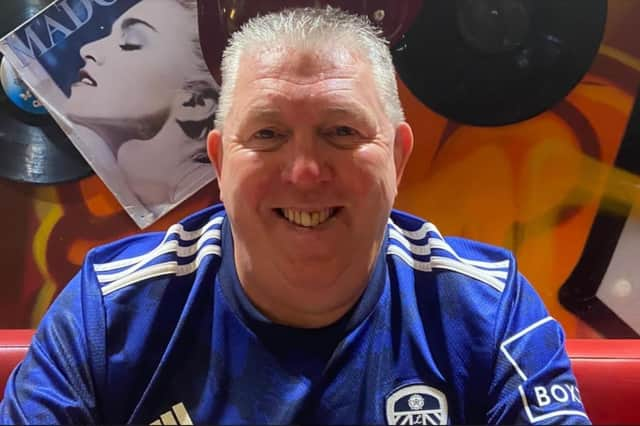‘This must never happen again’ - Rugby coach’s plea to save lives from lung cancer


Just two days before Christmas last year, he learnt he has incurable lung cancer – after waiting nine months to be diagnosed due to delays caused by the pandemic.
He had been looking forward to many more years working as coach education manager for the Rugby Football League. Now, that future has been taken from him.
Advertisement
Hide AdAdvertisement
Hide AdYet he refuses to become bitter or angry. Instead, he is giving precious time to front a national campaign by Roy Castle Lung Cancer Foundation to help save others.
Mr Tunningley, from Knottingley, said: ‘’In the spring of 2020, I caught Covid-19’.
‘’I wasn’t very ill, but it left me with a cough, quite an aggressive one. It just wouldn’t clear.’’
Initially reluctant to bother his GP with what he saw as a minor issue, eventually Mr Tunningley consulted his local practice.
Advertisement
Hide AdAdvertisement
Hide AdIn August, he was referred for an X-ray, which revealed a shadow on his lung. Twice, he was prescribed antibiotics, but the cough did not clear, and the shadow grew larger.
Finally, he was referred for a CT scan and diagnosed with stage 4 lung cancer which has now spread to other parts of his body.
He said: "I'm not angry about the time it took to get the diagnosis. The whole world was upside down and people were trying their best. It's just a fact of life that when I most needed to see my GP, it simply wasn't available.
"But what happened to me must never be allowed to happen again.‘
Advertisement
Hide AdAdvertisement
Hide Ad"I don’t want people to have to go through what I've gone through. It’s not just the individual, it affects the whole family so much. If I can help someone get an early diagnosis and then have treatment and a successful outcome, I’ll have achieved something really worthwhile.’’
While the pandemic has affected access to family doctors, the body that represents them is urging patients to continue using primary care services when they need to.
The Royal College of General Practitioners said: ‘’Because of coronavirus the way patients are seen in primary care has changed. Most appointments are currently carried out over the phone or via video in the first instance. We are reiterating to patients that if a face-to-face appointment is needed you will still be seen in person by a GP.’’
Echoing that message Mr Tunningley said: “I’d tell anyone with symptoms, such as a cough like I had, to consult their GP and stress to them the importance of being seen. Be a nuisance. Be persistent. We’re all so nice and polite but when your health is at risk, time really is of the essence.
Advertisement
Hide AdAdvertisement
Hide Ad‘’So, if that cough isn’t going away, there's a reason. If you've got symptoms, it's vital you take control and get your doctor to see you in person.’’
His case is far from unique. Lung cancer referrals fell by 69% last year, as Professor David Baldwin, chair of the Lung Cancer Clinical Expert Group, recently reported to the Parliamentary Health and Social Care Committee.
Prof Baldwin told the committee, “The (government’s initial COVID19) message was ‘stay at home if you have a cough’, so we saw a 30 per cent reduction in lung cancer incidents, and no recovery.
“It was like working 20 to 25 years ago. (We saw) late-stage disease, horrible presentations, all sorts of things that we'd actually forgotten about because we'd made so much progress on the early diagnosis pathway.”
Advertisement
Hide AdAdvertisement
Hide AdProf Baldwin added that it was still possible to address the crisis, citing the vital role of CT scanning and other early diagnosis initiatives, such as the Spot the Difference campaign by Roy Castle Lung Cancer Foundation.
This highlights subtle changes in health and fitness that could indicate lung cancer, and the need to act swiftly, no matter how seemingly minor the symptom may be.
A persistent cough that lasts three weeks or more is one of the key symptoms of lung cancer. Others include breathlessness, coughing up blood, hoarseness, fatigue, loss of appetite, back pain, and ‘clubbing’ of the end of the fingers.
Paula Chadwick, the charity’s the chief executive, said: "Richard Tunningley’s story shows exactly why our campaign is so important.
Advertisement
Hide AdAdvertisement
Hide Ad‘’We urge everyone to take a moment to think about their health – have there been any subtle changes? Anything our friends or family have mentioned to us? If so, don’t hesitate, go to see your GP, and get it checked out.
“If you are struggling to get an appointment, don’t give up. Continue to contact your GP practice and make sure the person you are talking to realises what the problems are, and that they’re urgent. Be proactive, take early action, and be persistent – it just might save your life.”
You can learn more about the work of Roy Castle Lung Cancer Foundation, symptoms of lung cancer, and the Spot the Difference campaign, by visiting roycastle.org